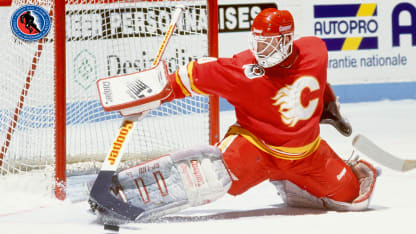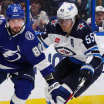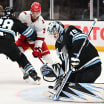The 2023 Hockey Hall of Fame induction is Monday. This class includes Henrik Lundqvist, Tom Barrasso, Pierre Turgeon, Mike Vernon, Caroline Ouellette, Ken Hitchcock and Pierre Lacroix. Here NHL.com columnist Nicholas J. Cotsonika profiles Vernon.
Nothing was too big for Mike Vernon.
The youngest of four brothers growing up in Calgary, naturally he ended up in net. His first coach was his mom, Lorraine, who took him to play "diaper league" at age 4 or 5. When his dad, Martin, coached his brother Kevin, the team had one goalie, so he brought Mike to take shots at the other end against kids five years older.
Vernon loved a position that others didn't want to play.
"I thought, 'This is great, because they never take me out of the game,'" he said. "'I'm never sitting on the bench.'"
That helps explain how Vernon made the Hockey Hall of Fame. He won the Stanley Cup with the Calgary Flames in 1989 and Detroit Red Wings in 1997, as well as the Conn Smythe Trophy as most valuable player of the Stanley Cup Playoffs in 1997, even though he was listed at 5-foot-9.
"I wasn't 5-9," he said with a laugh. "I was 5-7."
Really?
"Yeah."
Vernon overcame his size by reading the play and using his athleticism to react. He was confident and competitive, fiery and fun-loving, resilient and persistent.
"I just liked to play, and it was either him or me, and I'd do everything in my power to stop the puck, and I loved the challenge," he said. "I loved playing in big situations, and I liked the pressure being on me. I didn't mind it. I kind of thrived on it a bit.
"It's just the competitiveness that I had in my career, but I established it when I was a young man, a young kid. All my hockey growing up, it was all the building blocks to do all of that."
Vernon was named goaltender of the year and player of the year in the Western Hockey League with the Calgary Wranglers in 1982 and 1983. He helped the Portland Winter Hawks win the 1983 Memorial Cup and was named most outstanding goalie of the tournament.
His breakthrough in the NHL came in the 1986 playoffs, which he entered with 21 regular-season games of experience. The Flames defeated the rival Edmonton Oilers in seven games in the Smythe Division Final -- still Calgary's lone win against Edmonton in six playoff series -- and made the Cup Final for the first time. They lost in five games to the Montreal Canadiens, who also had a rookie goalie. His name? Patrick Roy.
Vernon set an NHL career high with 39 wins and helped the Flames win the Presidents' Trophy as the League's top regular-season team in 1987-88, then had perhaps his best season in 1988-89. He led the NHL with 37 wins, helped the Flames win the Presidents' Trophy again and finished second to Roy in voting for the Vezina Trophy, which goes to the League's best goalie.
One of his signature moments came against the Vancouver Canucks in overtime of Game 7 of the 1989 Smythe Division Semifinals. He made three big saves, including "The Save." Canucks forward Stan Smyl broke in from the blue line and fired, but Vernon flashed his glove and caught the puck. As he fell slowly on his left side inside the net, Vernon held the puck in the air and kept it outside the goal post.
"You held your breath the whole time he had the lone break from basically the blue line in, and to save the game and save our playoff run right there was unbelievable," said Lanny McDonald, then a Flames captain, now a Hockey Hall of Famer and the chair of the board of the Hockey Hall of Fame. "That's probably my all-time favorite."
The Flames won the Cup, defeating the Canadiens in six games in the Final, Vernon out-dueling Roy this time. It remains Calgary's only championship.
"He had the perfect personality and demeanor for a goaltender," said Terry Crisp, the Flames coach then. "He had confidence himself, but he also wasn't afraid to speak his mind. That's what I respected about Mike. He and I had some good jawing sessions, coach to player. Mike just didn't roll over and say, 'Yeah, well, OK,' and then go and moan and groan. [He said] 'No, you're totally wrong. I'm the goalie. I know what I'm doing.'"
Crisp laughed.
"Every time I see Mike now, I say, 'Well, you going to yell at me again?'" he said.
The Red Wings needed that moxie when they acquired Vernon on June 29, 1994. They had a good young goalie in Chris Osgood but had been upset in seven games in the opening round of the playoffs for the second straight season, this time by the eighth-seeded San Jose Sharks.
"In the playoffs, it is a bonus to have an experienced goalie that's been there. That's been there, done that, you know?" said Scotty Bowman, the Red Wings coach and director of player personnel then. "I had a good relationship with him. I used to kid him a lot. I don't know how to describe him, but he always had, like, a smirk or a laugh, you know?"
Bowman laughed.
"People often said, 'Aw, Vernie's not serious,'" Bowman said. "But that's probably what helped him more than hurt him."
Vernon said he was rejuvenated by the trade to Detroit. He helped the Red Wings win the Presidents' Trophy and make the Cup Final in 1994-95, but they were swept by the New Jersey Devils. He backed up Osgood in 1995-96, when they shared the Jennings Trophy for fewest goals against and Detroit won the Presidents' Trophy. Osgood was in net when the Red Wings lost in six games in the Western Conference Final, igniting a bitter rivalry with the Colorado Avalanche and an old foe, Roy.
Another of Vernon's signature moments came March 26, 1997, when Vernon fought Roy during a brawl. Detroit defeated Colorado 6-5 in overtime in Vernon's 300th NHL win. After backing up Osgood in the regular season, Vernon started in the playoffs and led the Red Wings to their first championship since 1955, defeating Roy and the Avalanche in six games in the conference final.
"He made a major impact on us," said Hockey Hall of Famer Jimmy Devellano, then the Red Wings general manager, now their senior vice president. "You don't win a Stanley Cup without good goaltending. He gave it to us."
Vernon said he was shocked when NHL Commissioner Gary Bettman announced him as the Conn Smythe winner.
"It was a moment for myself that [showed] I can still play in the National Hockey League," Vernon said. “I can still contribute. Even a 5-7 guy can still compete at a high level. It was a lot of self-gratification in that."
Vernon continued to compete. He helped the Sharks make the playoffs in 1997-98 and 1998-99, and the Florida Panthers in 1999-2000. Each team had failed to qualify the two seasons before his arrival.
After finishing his 19-season NHL career in Calgary in 2001-02, he ranked seventh in regular-season wins (385) and sixth in playoff wins (77) in NHL history. Among goalies at the time, he ranked fourth in playoff games (138).
"I loved the way he played," said former New York Rangers goalie Mike Richter, who won the Cup in 1994 at 5-10. "I wasn't a particularly big goalie, but I have to say I towered over him. But I really appreciated the preciseness of his game and the scrappiness of his approach."
NHL.com staff writers Amalie Benjamin and Derek Van Diest contributed to this report


















